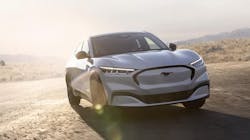Ford’s Farley: EV Cost Parity Will Come After 2030
Making electric vehicles will be cost-competitive with legacy combustion-engined cars in 2030 at the earliest, Ford Motor Co. CEO Jim Farley said May 31.
Speaking to an investor conference hosted by research firm Bernstein, Farley said it will take Ford at least another product generation to simplify its EVs’ designs and wring out enough costs. That puts the cost parity target for a typical $40,000 EV between 2030 and 2035, during Ford’s transition from its second to its third cycle of EV products. By then, he added, lithium iron phosphate batteries will dominate and Ford will have “dramatically lower labor content and dramatically lower distribution costs.”
Click here to hear Ford Director of Electrified Systems Engineering Charles Poon explain why lithium-iron phosphate (LFP) batteries should make such a difference in the future of the automaker's EVs.
Farley has long been hammering away at the need for simpler vehicle designs—and told the Bernstein audience that the second generation of Ford EVs will have 40% fewer fasteners, for instance—but also said May 31 that “a lot more regulatory support” than the new $7,500 tax credit will be needed to get EV adoption rates to 50% of the U.S. market over time.
Ford’s CEO added that price competition is today concentrated in certain EV categories—he quickly pointed out that Ford’s F-150 Lightning truck or E-Transit commercial van aren’t being affected—and said the pain among makers of mass-market EVs will be “much, much harsher than people think” in order to significantly lift adoption rates.
“What transformation isn’t ugly?” Farley responded to a question from Bernstein analyst Toni Sacconaghi Jr., citing Henry Ford’s trailblazing assembly-line work more than a century ago as well as his charge two years ago to the Ford team to trim $5,000 in costs from its Mach-E SUVs. “That’s what happens.”
Farley wasn’t the only auto executive talking price pressures May 31: In a video posted on Volkswagen AG’s intranet, Chief Operating Officer Ralf Brandstätter said the German auto giant will focus on a “sustainable business model” in the fast-growing Chinese market and not get dragged into a discounting battle there.
“Our market position is strong enough,” Brandstätter said. “For us, the focus is on profitability, not sales volume or market share.”
Shares of Ford (Ticker: F) fell more than 4% to $12.00 May 31. Over the past six months, they have retreated about 15%, trimming the company’s market capitalization to roughly $48 billion.
About the Author
Geert De Lombaerde
Senior Editor
A native of Belgium, Geert De Lombaerde has been in business journalism since the mid-1990s and writes about public companies, markets and economic trends for Endeavor Business Media publications, focusing on IndustryWeek, FleetOwner, Oil & Gas Journal, T&D World and Healthcare Innovation. He also curates the twice-monthly Market Moves Strategy newsletter that showcases Endeavor stories on strategy, leadership and investment and contributes to other Market Moves newsletters.
With a degree in journalism from the University of Missouri, he began his reporting career at the Business Courier in Cincinnati in 1997, initially covering retail and the courts before shifting to banking, insurance and investing. He later was managing editor and editor of the Nashville Business Journal before being named editor of the Nashville Post in early 2008. He led a team that helped grow the Post's online traffic more than fivefold before joining Endeavor in September 2021.
